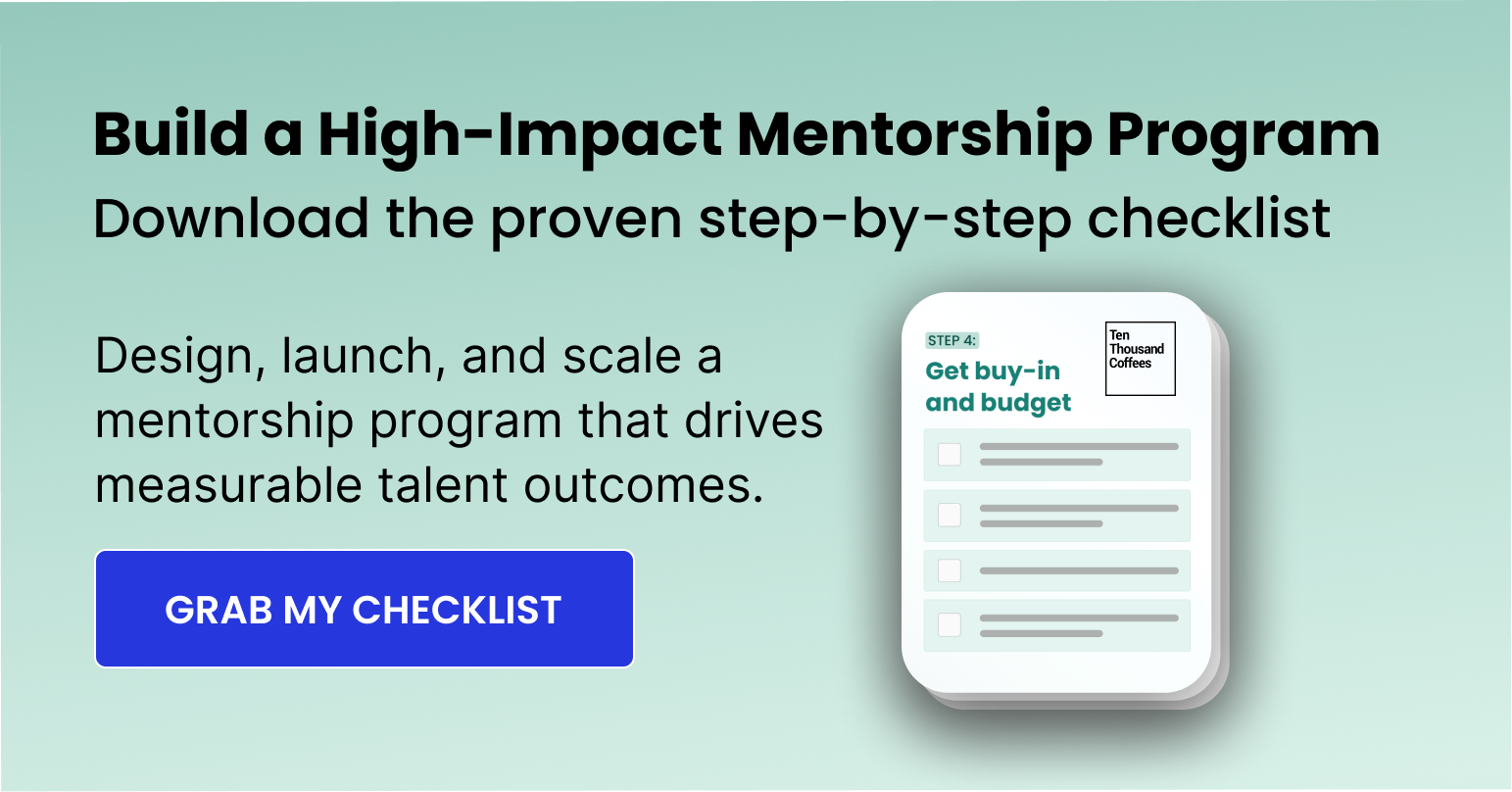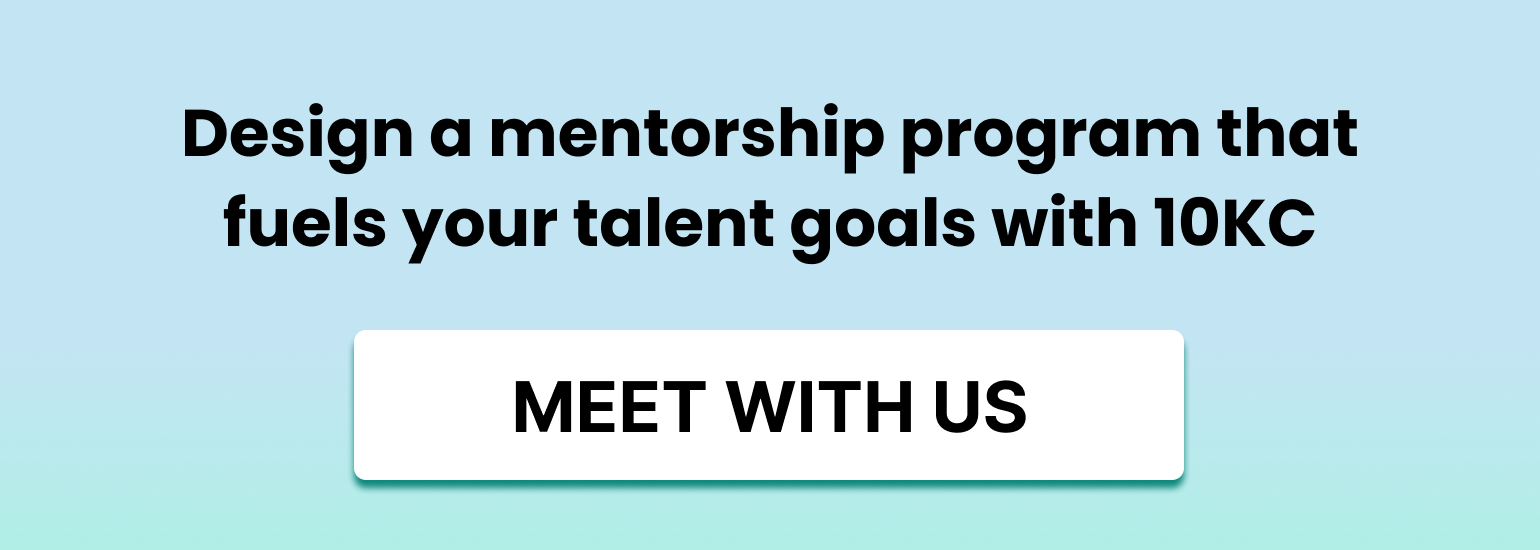Feeling stuck on how to design an impactful, scalable mentoring program? You’re in the right place.
Mentorship can be a powerful driver of growth for your organization. But taking your mentorship program from ideation to execution in a meaningful way goes beyond simply pairing mentors with mentees. Without the right structure, mentoring risks becoming a feel-good initiative—rather than the strategic pillar your talent development strategy needs.
This step-by-step guide brings together corporate mentorship tips and best practices. Consider it your template to create a high-impact program that delivers tangible results.
Structure or spontaneity? Why you need structured mentorship programs
Mentorship has traditionally been viewed as an informal development initiative. And while the organic, human connection at the heart of mentorship is essential, relying solely on spontaneous connections—or offering nothing more than a matchmaking service—falls short.
Unstructured mentorship, whether entirely organic or loosely guided through a basic matching initiative, comes with real risks: inconsistency, lack of accountability, hyper-focus on individual employee development, and an inability to drive or measure big-picture outcomes. At best, it becomes a “feel-good” initiative. At worst, it reinforces existing biases, leaving entire groups of employees—often those with the most to gain—excluded from growth opportunities.
More importantly, it represents a missed opportunity. When mentorship isn’t aligned to clear goals, outcomes, or business priorities, it’s impossible to prove its value—making it hard to secure resources, scale the program, or make it a true lever for talent development.
The solution? Adding thought and structure.
The answer isn’t to strip mentorship of its authenticity. It’s to add intentionality. A well-structured mentoring program doesn’t stifle organic connection—it amplifies it. Structured programs empower employees to build meaningful relationships and align them with the development outcomes your organization cares about most: engagement, retention, mobility, and growth.
💡 It’s important to remember that structure doesn’t have to mean rigid.The best programs are flexible by design, creating space for personalization, dynamic learning formats, and mentor-mentee relationships that evolve. With structure, you get a program that’s not just scalable—but sustainable, measurable, and deeply impactful.
7 elements of a successful mentorship program
Successful programs aren’t defined by mere existence, or even participation. They’re defined by impact. In other words— are you fueling talent outcomes and generating measurable results?
And while no two mentorship programs are exactly alike, there are some best practices. After helping over 200 leading organizations implement mentorship programs, we’ve identified a few key elements that lend to consistent success:
1. Program goals that ladder up to larger talent outcomes: It’s nearly impossible to achieve or even define success if mentorship programs don’t align with the talent and business priorities that leaders and key stakeholders care about.
📌 READ MORE: Effective Mentorship Programs Start with Strong Goals. Here's How.
2. Stakeholder buy-in: Decision-makers, leaders, and employees within the organization need to believe in the value and potential of mentorship in order to maximize outcomes and program engagement.
3. Business case and ROI: Business cases that map mentorship to positive ROI keep efforts focused while generating the necessary buy-in. Without a compelling case, program managers often don’t get the resources and support they need, leading to underperforming and deprioritized programs.
4. Scalable program structure and content: Smaller-scale pilot programs are great for proof of concept. But your early success should be replicable at scale, otherwise it limits the impact and reach of your program.
5. Strategic mentor-mentee matching: Successful mentoring programs don’t just match mentors and mentees based on seniority or proximity, rather they generate strategic pairings based on employee goals and organizational objectives.
6. Consistent communication strategy: Keeping employees informed and engaged is critical for maintaining momentum and preventing mentorship programs from fizzling out.
7. Proper tooling and technology: Programs that leverage technology tend to come out ahead of those stuck in spreadsheets.
📌 READ MORE: Strategies to Take Your Corporate Mentorship Program to the Next Level
6 steps for success: your modern mentorship program template
Before diving into program design, it’s important to set the stage for long-term success.. That means securing stakeholder buy-in, setting relevant program goals, and considering the right mentoring software to support your vision.
Why is this so important? Because the most effective mentorship programs aren’t built in isolation—they’re intentionally aligned with your company’s talent strategy and designed to meet the outcomes that matter most to your stakeholders.
“When I think about designing talent programs, I absolutely have my own objectives too as an HR practitioner. But to sell others on it, you need to describe the value from their perspective. When I talk to all different stakeholders, I put the bottom line for them on top and talk about the program from their vantage point.” - Christine Silva, Talent Advisor, former leader at RBC, Catalyst, Shopify
Laying this groundwork gives you the clarity you need to build a mentoring program that’s not only engaging, but scalable, sustainable, and outcome-driven. Only once that foundation is in place should you move on to designing the program experience itself.
Here’s a mentorship program template—or step-by-step guide—you can use to design and structure a successful and impactful mentoring experience.
1. Include your employees
While you should have your organizational goals, mentorship should also move the needle on the things that matter the most to the people actually participating in the program—your employees. You’ll struggle to foster engagement and drive results if employees don’t feel the program meets their goals, needs, and preferences.
Some of this information may already exist in previous engagement surveys. But you can also get up-to-date insights by conducting focus groups and interviews, or sending out mentorship-specific surveys to really dig into the desired outcomes and needs of your employees—both quantitative and qualitative.
“You've got to understand the different groups and what will be valuable for them. Looking at the data that you have, talking to people, getting a pulse check on what their priorities might be, talking to the employees themselves, talking to leaders in those areas, talking to HR business partners. I can't stress enough how much value you get from deeply understanding the people you're trying to serve.” - Christine Silva, Talent Advisor, former leader at RBC, Catalyst, Shopify
2. Create strategic matching criteria
Your mentor-mentee matches can make or break your mentorship program. It goes beyond simply providing employees with a mentor—rather, you should be strategically pairing peers based on your organizational and talent needs.
"There's no one-size-fits-all to what are the right matching criteria to use. It all depends on your goals. The goals of the program—in terms of the program design and what all the stakeholders care about—and the goals of each individual participant. - Christine Silva, Talent Advisor, former leader at RBC, Catalyst, Shopify
Below are some of the most common match types we see, what they’re used for, and the data you’ll need to power them:
- Team or department. Use it when: You want to break down silos and encourage cross-functional collaboration. Data you’ll need: Employee’s department, team, or business unit.
- Seniority level or role. Use it when: You want to support upward mobility, build peer mentoring cohorts, or create reverse mentoring opportunities. Data you’ll need: Job title, job level, or job family.
- Talent segment. Use it when: You’re targeting specific groups—like early talent or new managers—for focused development. Data you’ll need: Talent group flags.
- Geographic location or time zone. Use it when: You want to make in-person events a priority, support return-to-office strategies, or simplify scheduling across time zones. Data you’ll need: Office location, city, region, or time zone.
- Skills and experience. Use it when: You’re focused on skill-building—matching those who want to learn a skill with those who can teach it. Data you’ll need: Skills offered, skills sought, experience in specific areas.
- Tenure. Use it when: You want to onboard new hires, integrate employees into new teams, or promote internal knowledge sharing. Data you’ll need: Start date, time in role, time at the company.
- Interests and career goals. Use it when: You’re empowering employees to drive their own development journeys based on what matters most to them. Data you’ll need: Stated career goals, learning interests, or internal mobility preferences.
- ERG or affinity group participation. Use it when: You want to foster DEI, representation, and belonging across your organization. Data you’ll need: Voluntary self-identification, ERG participation, DEI-related interests.
💡 Smart-matching technology : Here’s an example of where your tech stack can save you massive amounts of time. Maximize the impact of matches by automatically connecting employees with relevant mentors, peers, and experts across your company. Match employees based on your customized criteria, and integrate with your HRIS to reflect the latest employee data.
3. Define the program experience
As we’ve established so far, mentoring programs are much more than just mentor-mentee matches. While mentorship puts talent back in the driver’s seat of their development, your organization is still responsible for laying out the road ahead of them.
The structure of your mentorship program should clearly outline its key components and include development resources to support participants. Some things to consider when designing your program curriculum and experience include:
- Program format: Mentorship doesn’t look the same across organizations and your objectives should inform your program format. For example, will your program be continuous or cohort-based?
- Diverse, personalized learning experiences: Everyone learns differently and different goals require different formats.. Instead of relying solely on one-on-one relationships, offer a mix of formats, such as one-to-many mentoring, group learning experiences, and networking opportunities to meet all your development and talent needs.
- Learning and development resources: You need to provide the building blocks for growth and development in your mentoring program. Leaving mentors and mentees to their own devices can be frustrating and lead them to stray from desired outcomes. Equip them with discussion guides and learning prompts that align with your talent goals. Even simple resources—like curated articles, short videos, or ready-made templates—can go a long way in keeping the experience focused and valuable.
- Expectations, timelines, and milestones: A clear roadmap keeps engagement high. Take the time to outline key goals and milestones so everyone, from stakeholders to participants, knows where they are in their mentorship journey. Without structure, participation can taper off. Be sure to define key details like program duration, meeting cadence, and check-in points along the way.

4. Develop a communications plan
We’ve all heard the saying: Communication is key. This also rings true when delivering effective mentoring programs.
There are two primary types of mentorship program communications:
- Initial comms to promote the program and drive program adoption.
- Ongoing comms to stay in touch and keep participation and engagement high.
When initially promoting the program, highlight the clear benefits for both mentors and mentees. Develop a variety of materials to continuously promote the program and keep employees informed, with things like Q&A sessions with program leaders, tips from experienced mentors, and mentor/mentee spotlights.
Once the program is underway, ongoing communication is essential to maintain momentum. Keep participants informed with timely updates, announcements, and reminders so they never miss a session. Lean on automated nudges and notifications to prompt actions like sending invites or preparing for upcoming meetings—so the experience stays seamless and top of mind.
The key to clear communication? Choosing the right channels for your target audience. For many organizations, this means leaning into the tools and platforms your employees already use every day—whether that’s email, social media, Slack, or even in-person events. This helps mentorship feel like an extension of the work they’re already doing, rather than a completely separate initiative.
5. Measure and evaluate
How you measure and evaluate program success can’t be an afterthought. Rather, it should be an integral part of your program design—it helps you demonstrate value and ensure continued growth and effectiveness.
This includes looking beyond program metrics. Sure, short-term indicators, like program participation and meeting frequency, can function as early signs of success. But what you should really be looking at is how they ladder up to the long-term lagging indicators that are tied to business performance, like retention, engagement, and promotion rates.
The best mentorship software can help ensure effectiveness by collecting platform analytics and sending out surveys at predetermined intervals—so it’s easy to stay on top of program performance and draw insights for continuous improvement.
📌 READ MORE: How to Measure the Business Impact of Corporate Mentorship Programs
6. Celebrate your wins
You already know the power of mentorship to drive real impact in the workplace. The challenge many program managers face is proving that impact. Showcasing wins—loudly and proudly—is essential to sustaining buy-in, growing support, and securing the budget to scale.This includes demonstrating ROI and collecting the qualitative and quantitative data to prove it. It also means celebrating the hard work and contributions of program participants.
Intentionally build opportunities to acknowledge and honor all the achievements your program has delivered. This could look like public acknowledgements on company newsletters and social media, or capstone events and award ceremonies. These touchpoints not only honor the efforts of mentors and mentees, but also reinforce the value of mentorship for future cohorts and potential participants.
The role of technology in your corporate mentorship program
In order to implement any structured mentorship program, you need the right tech stack to support it. Otherwise, you’ll find yourself saddled with unscalable manual processes that make it difficult to achieve your talent goals.
Mentorship software is purpose-built to help you implement and deliver high-impact mentorship programs. It will centralize and power your mentoring initiatives while solving the common challenges that can hold programs back.
Put simply, the right mentorship software is your partner in building, managing, and scaling a successful program. It brings your strategy to life—providing the structure, tools, and support needed to turn great intentions into measurable outcomes.
When choosing a mentorship software, look for features and capabilities that enable structured mentorship programs, including:
- Data-driven smart-matching: Skip the spreadsheets and automatically create strategic mentor-mentee matches based on relevant organizational context and criteria.
- A variety of mentorship formats: Look for group learning, networking capabilities, and other diverse formats that can elevate the mentoring experience and encourage individual participants to learn the way they learn best.
- Learning and development resources: Expert-backed curricula and discussion guides are key for maximizing learning and development outcomes.
- Personalized pathways and experiences: Put one-size-fits-all programs in the past. Keep an eye out for software with the ability to build mentoring and social learning experiences that are unique to each individual and your business needs.
- Robust reporting capabilities: You need the insights and data to track, analyze, and monitor program success and demonstrate ROI.
- Integrations with your tech stack: Streamline your mentoring experience and reduce the lift of implementing and managing your program with integrations with your key business platforms.
Find your partner in mentorship success with 10KC
At 10KC, we help leading organizations manage and scale mentorship programs that fuel high-performing teams and accelerate your talent goals. From smart matching and flexible formats to guided experiences and measurable results, our mentoring platform is purpose-built to turn mentorship into a powerful, strategic lever—not just a feel-good initiative.










.png)